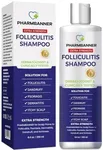Buying Guide for the Best Shampoos
Choosing the right shampoo can make a big difference in the health and appearance of your hair. The best shampoo for you depends on your hair type, scalp condition, and any specific concerns you want to address, such as dryness, oiliness, dandruff, or color protection. It's important to understand what each shampoo offers and how it matches your needs, so you can make a choice that supports your hair goals and keeps your scalp healthy.Hair Type CompatibilityThis refers to whether a shampoo is formulated for a specific hair type, such as oily, dry, normal, curly, straight, or color-treated hair. Using a shampoo that matches your hair type is important because it ensures your hair gets the right balance of cleansing and nourishment. For example, shampoos for oily hair are designed to remove excess oil, while those for dry hair add moisture. To pick the right one, first identify your hair type and look for shampoos that specifically mention compatibility with it.
Scalp ConditionSome shampoos are designed to address scalp issues like dandruff, itchiness, or sensitivity. This is important because a healthy scalp is the foundation for healthy hair. If you have a sensitive or problematic scalp, look for shampoos labeled as soothing, anti-dandruff, or hypoallergenic. If your scalp is generally healthy, a regular shampoo should suffice. Consider your scalp's needs as much as your hair's when choosing a product.
Cleansing Strength (Sulfate Content)Cleansing strength refers to how thoroughly a shampoo removes dirt, oil, and product buildup. This is often related to the presence of sulfates, which are strong cleansers. High-sulfate shampoos clean deeply but can be harsh and strip natural oils, making them better for very oily hair or occasional deep cleaning. Low-sulfate or sulfate-free shampoos are gentler and better for dry, damaged, or color-treated hair. Choose based on how often you wash your hair and how much buildup you typically have.
Moisturizing IngredientsMoisturizing ingredients like oils, butters, or glycerin help keep hair hydrated and soft. This is especially important for dry, curly, or damaged hair, which needs extra moisture to stay healthy. If your hair feels dry or frizzy, look for shampoos with added moisturizers. If your hair is oily or fine, you may want a lighter formula to avoid weighing it down.
Special Treatments (Color Protection, Repair, Volume)Some shampoos offer additional benefits like color protection, repair for damaged hair, or added volume. These features are important if you have specific hair goals, such as maintaining dyed hair, repairing split ends, or making fine hair look fuller. Choose a shampoo with the special treatment that matches your main concern to get the best results.
Fragrance and SensitivityShampoos come in a variety of scents, but some people are sensitive to fragrances or prefer unscented products. Fragrance can make the washing experience more pleasant, but if you have allergies or a sensitive scalp, look for fragrance-free or hypoallergenic options. Consider your personal preference and any sensitivities when making your choice.


















